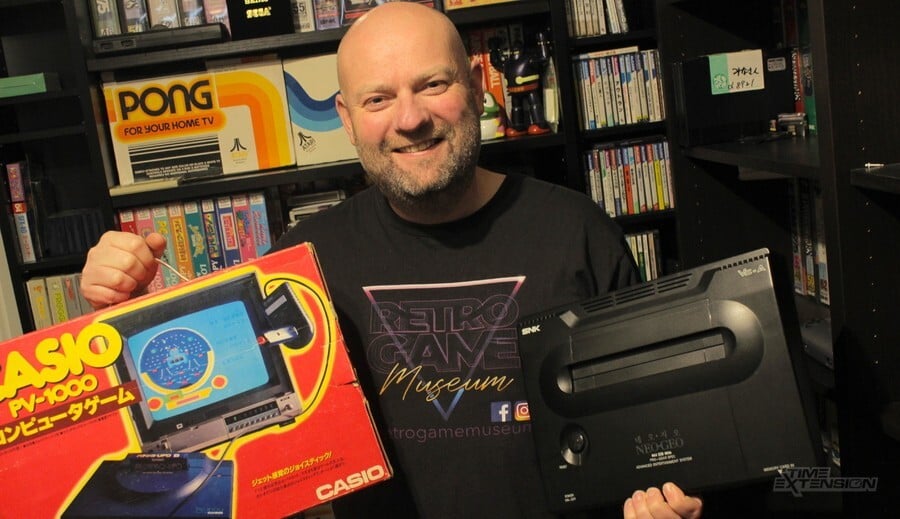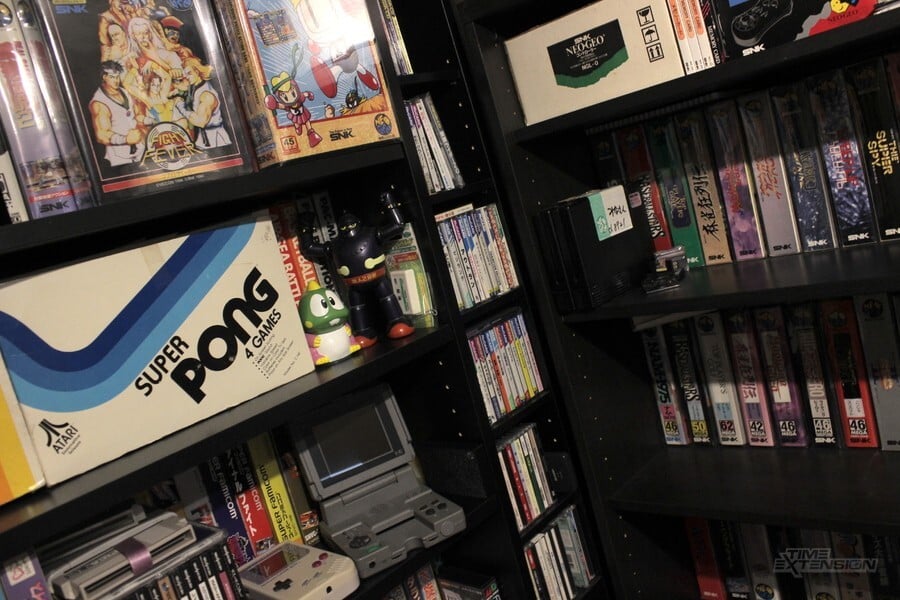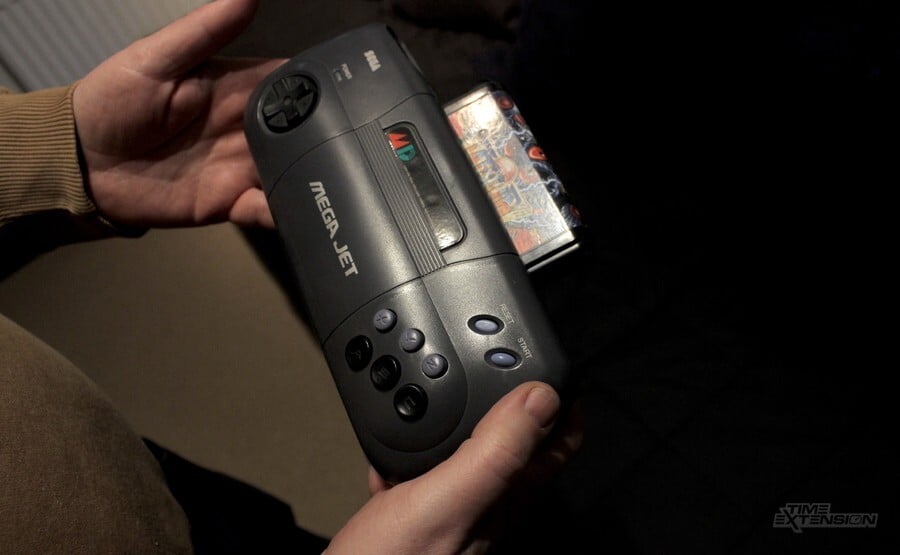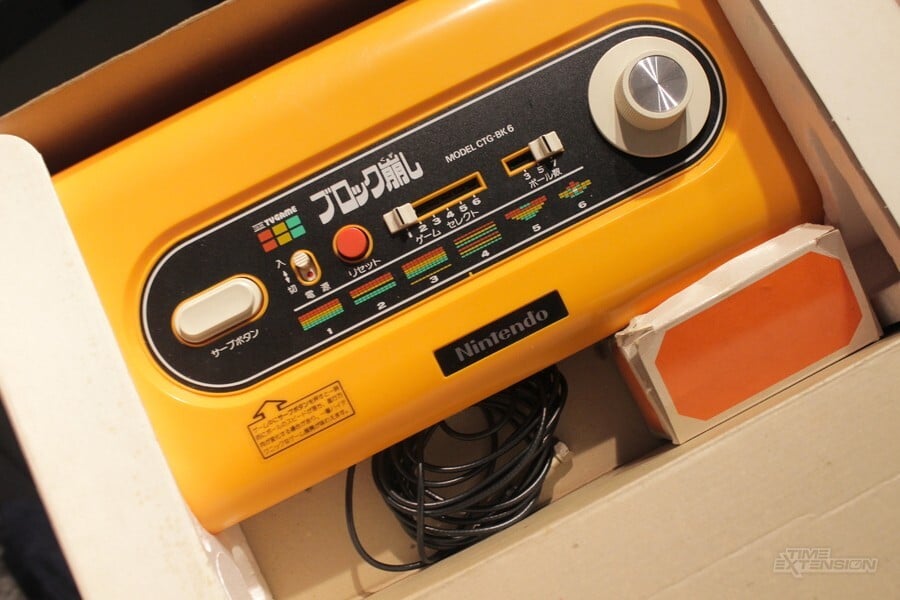
The UK-based retro collector Frazer Rhodes has been buying rare and obscure video games for the past three decades now and has amassed a pretty enviable collection in all that time.
He's the proud owner of a complete Neo Geo set, as well as a bunch of strange and interesting oddities, such as the Casio PV-1000, Gakken Compact Vision TV Boy, and PC Engine LT. And that's only really scratching the surface.
But while most people would be tempted to try and keep an amazing collection like this all to themselves, Rhodes seems to be taking a more altruistic approach when it comes to his own impressive haul. In the past, he's used his collection to help out with various book projects (including Neo Geo: A Visual History and N64: A Visual Compendium) as well as preservation efforts to make sure these consoles are properly documented. He is now in the process of setting up his own Retro Game Museum (scheduled to open later this year as a travelling exhibit) and has established a small pop-up shop in the Halifax freeplay arcade Blast from the Past to promote his latest venture.
Recently, Time Extension met up with Rhodes in Halifax to chat about how he managed to build such a remarkable collection and ask him a bit about these upcoming plans. You can read our interview with him below:
Time Extension: To start, it would be interesting to know — when did you first become interested in collecting games?
Rhodes: I’ve always been into video games. My first ever interaction with video games was probably with an Atari 800XL. But the game system that I really loved was the Neo Geo.
I managed to work hard enough to buy one of those back in 1992. I built up a small collection, sold it, and moved on, but then I started to get the bug back in about 97/98, buying a few games that were really cheap (because back then they were still kind of classed as retro).

Fast forward to 2004 when I had a decent job and a decent income, I just really started to explore really what was my favourite period — which was 1990/91 — and got curious about some of the game systems that you read about in the magazines, but, of course, never really had an opportunity to play or own back in the day. You know, everything from the PC Engine SuperGrafx to the PC Engine LT to the Mega CD, Wonder Mega, and so on. I also started to build back the Neo Geo collection and just kind of ran with it.
Eventually, I got to a point where I collected a full Neo Geo AES, but I also started down these avenues of other systems and games. Once you kind of go down that rabbit hole, then you just start uncovering more and more things that you become interested in, and then I guess you start learning how to find those things in other countries – particularly in Japan.
Time Extension: I guess that’s the next big question. How do you source a lot of this stuff? Is it just prowling eBay auctions and Yahoo Japan and things like that? Or is it a bit more involved? Do you have to form those connections with people overseas to get this stuff?
Rhodes: So, originally, a lot of the stuff came from kind of eBay. At one time there were a few Neo Geo items on eBay – I’m talking sort of early 2000s here – and you would be able to start buying things internationally.
I remember times when we would buy Neo Geo games – me and a friend – from the US and we would literally mail US dollars in the post to be able to buy this stuff. You kind of sent it off hoping for the best. Well, then things like PayPal revolutionized being able to buy things from overseas.
Eventually, though, eBay sort of petered out for me — although, there is some stuff that I would still buy from there — and I started to get interested in buying things directly from Yahoo Japan using proxy services and then eventually getting a trusted friend over there who would buy things on my behalf. And I would be looking at Yahoo Japan, Mercari, and so on.
Then, of course, there was the growth of Facebook groups and other kinds of social media groups where it brings people together who have a particular interest — being able to not just buy but to trade. I guess that’s where some of the rarest items start to change hands.
Time Extension: You’ve been collecting for a long time now. It would be interesting to get your opinion on prices in the retro game market and how they’ve changed over time. What changes have you seen during the time you’ve personally been collecting?
Rhodes: So, one of the things that I always try to do is buy the best I can. So from a collector’s perspective, I try to buy the item that is in the best condition possible. And what we’ve seen, I think is those things continue to increase. I mean, they’re not making any more of this stuff, right?

But I also think people have started to look at more and more niche things. At one time, the obscure stuff – nobody was interested in it at all. But those have now become more sought after. So things that were sort of untouched and less mainstream now are starting to rocket up in price, which means some of the stuff you see here would be almost unobtainable now. It’s a shame in a way, but, on the flip side, at least there are other alternatives for people who actually want to play these games – whether it’s emulation or other means like multi-carts and things like that.
Time Extension: This is sort of a two-part question, but what are some of the pieces in your collection that you’re most proud of? And I’m wondering, what are some of the most valuable things that you’ve collected?
Rhodes: So the thing that I’m kind of most proud of is the full Neo Geo set. There are some games in here that are worth silly money now, and I thought I was paying a lot of money for them back then. I think the most expensive game I’ve bought is Chibi Maruko-Chan Quiz, which is a kid’s quiz game from 1995 that literally nobody bought.
I paid £1100 for that game, but it’s probably worth something in the region of £16,000 to £20,000 now. So that’s kind of one game from what I’ve got here, which is roundabout 160 game cartridges. So that’s kind of my first love I suppose. Plus I’ve also got various other items that are Neo Geo-related, like the Korean Neo Geo System from Vic-A, a Hong Kong copier cartridge that took me ages just to piece together with all of the RAM carts, and so on.
Outside of that, I really do enjoy collecting PC Engine stuff. The PC Engine LT is another kind of jewel in the collection. [The same also goes for the] Sega Wonder Mega, The FM Towns Marty, and the FM Towns Marty's selection of some amazing arcade ports that were produced back in the day. I’m also really curious, for some reason, about Casio’s foray into the gaming market. So I've got a full set of the Casio Loopy, which I suppose is a bit of an oddity. And then I’ve been chasing a full set of the Casio PV-1000 and Casio PV-2000, which I’ve just recently managed to complete. Those are really obscure sort of systems.
Time Extension: Are there any kind of holy grail items that you’ve been chasing recently?
Rhodes: It was the PV-2000 collection, but one other item came up this week and I bid but I didn’t win it. Back in 1983, when everybody in Japan was throwing their hat into the ring when it came to game consoles, there was a console made by Nichibutsu and it was called MyVision. Only six games were released and it was incredibly expensive at the time, so it didn’t sell particularly well. But it’s just another one of those curiosities that have always kind of escaped me. Maybe one day it will turn up.
Time Extension: Obviously, there’s a bit of a reputation of collectors buying these kinds of items and keeping them locked away to themselves, but talking to you, it seems like you’re very open to working with people who are preserving this stuff and showing this stuff off to people. For instance, you have plans to start a Retro Museum. Could you talk a little about that and your thoughts on why you want to share this stuff with people?
Rhodes: Sure, yeah! One thing that I’ve never really been a big fan of is collecting sealed games and things like that. The whole purpose of these things is to be enjoyed. I could just sit here and keep everything in this games room, but that feels like a waste, to be honest. There are things in here that people have genuinely never heard of or never had an opportunity to experience.
Often in museums, [these games] are on show, but they are usually behind a glass wall. You can’t actually get hold of them. And there’s no better way to experience them, I think, than on the original hardware that was intended back in the day.

I also think age is an important factor. These things won’t last forever, and so, we should put some effort into both preserving them in whatever form that we can, but equally allowing people to have that type of interaction with them as it was intended back in the day. So yeah, I’ve got some plans this year to kind of take the Retro Game Museum on the road. What does that mean? Well, I’m trying to kind of focus my efforts on more of the corporate market where we can essentially – if there is a team event or an event where people want to get together and take an interest in this stuff – take along a whole selection of game systems.
That could be the history of Nintendo or the "super rare" or Sega Vs. Nintendo. Whatever that selection might look like, we can then set them up, allow people to interact with them, and have information kind of describing the background of those systems and what they’re interacting with — and maybe have an element of competition as well. So it’s a work in progress, but that’s kind of our intention for this year.
Time Extension: I’m wondering in regards to a timeline on that. Is there any roadmap in place? Or are you still figuring things out?
Rhodes: I’ve got my first event in May, which I guess is a bit of a dry run really. So we’ll see how that goes. I’ll just use that as an opportunity to get kind of feedback and test the market, I suppose. Then after that, I’ll be able to set that up based on my experience there and see what the interest is. So yeah, coming soon!
Time Extension: You currently have a pop-up shop in Blast From The Past, a small freeplay arcade located in Halifax Piece Hall. How did that come about?
Rhodes: Well how it came about is this... I actually pitched the idea of a retro game arcade to the Piece Hall around 5 years ago. I pitched it as a joint venture - they provide the space, I provide the content/systems, etc and we split the entrance fees. They decided it wasn't for them (they didn't want to take on any risk)...
Fast forward a few years and Ryan started pretty much what I was suggesting, although he has the focus on pinballs and indeed took on the risk (he pays for the space).
Separately I was selling off some gear and had an accident with a mint copy of ET for the Atari 2600 - I dropped something on the box... annoyed with myself I stuck it on Facebook marketplace to sell it off. Turns out Ryan was looking for a copy to go with his copy of Centipede which was a copy that was unearthed in the New Mexico desert if you know the story (I'm sure you will). That put us in touch and Ryan came to visit.
I've been providing some business coaching for Ryan and he helped me recently at the Video Game Market in Leeds. When he moved into a larger unit I proposed to move some of my gear into the Blast from the Past Arcade as it just adds another dimension to his offering there and it's a win-win for both of us!
Time Extension: Is there anything else that you might want to add about the Retro Game Museum and its mission?
Rhodes: I think, for me, part of the goal of the Retro Game Museum is really to reflect back on the history and how we got where we are with video games. And, for me, it’s really about celebrating a lot of the, I guess, perceived failures along the way.
Some of the consoles that we talked about earlier – yeah, they didn’t fare so well, but actually in not so faring so well and those companies having a go at this stuff and making some weird and wonderful decisions, it’s shaped how we have consoles today. With each iteration of those, these companies have learned and changed and improved, and so on. There are some famous ones. For example, Virtual Boy is often cited as a failure by Nintendo. Well, Nintendo learned from that.
Maybe it was just a case of great technology, but the wrong time, or it might have been a console where they just got their marketing strategy wrong or it landed when lots of other consoles were coming into the market. There are all sorts of other learning points, I think, from a perspective of the history of games. So it’s kind of telling that story and celebrating some of the failures – not for failing in themselves, but for contributing to how we see and perceive video games to this day.

